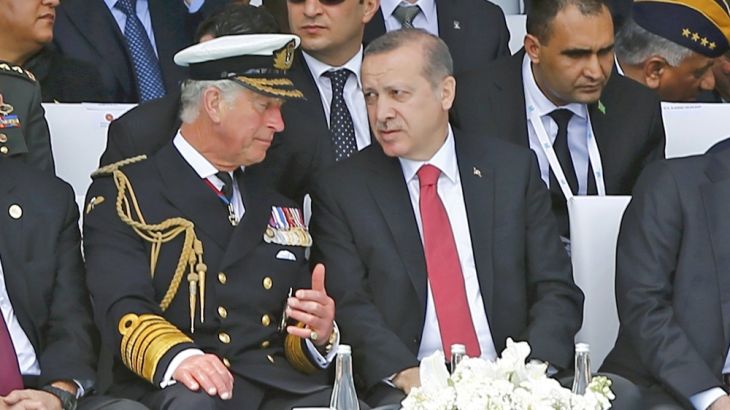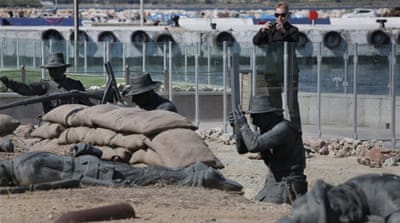World leaders join Gallipoli commemoration in Turkey
Ceremonies to remember the fallen of World War I battle pitting German-backed Ottoman forces against Allied troops.

Turkey is holding international commemorative events for people who died in the World War I battle of Gallipoli.
Friday’s commemoration sends a message of reconciliation of what was one of the most famous Ottoman victories of the war in which tens of thousands of people lost their lives on both sides of a nine-month battle.
 |
| The land campaign in Gallipoli began when Allied troops launched their attacks in April 1915 [AP] |
German-backed Ottoman forces and Allied forces, including Australian, British and New Zealand troops, tried to break through to take Constantinople and knock the Ottoman Empire out of the war.
Keep reading
list of 4 itemsUN Security Council passes motion denouncing attacks on aid workers
UK’s Sunak says no Rwanda deportation flights before election
Israel’s war on Gaza: Rights groups urge Biden to oppose threats to ICC
The events marking the centenary of the Gallipoli battle are tinged with controversy as the commemorative events of the mass killing of Armenians are taking place on the same day.
Armenia says up to 1.5 million Armenians were killed in a campaign of genocide by the Ottoman authorities to wipe out their people.
But Turkey has resisted the term genocide, sticking to its line with even greater vehemence in the run-up to the anniversary.
The Gallipoli land campaign began on April 25 when the Allied troops launched their attacks.
Q&A: The legal battle over ‘Armenian genocide’
Armenians mark the start of the massacres on April 24 when Armenian leaders and intellectuals were rounded up in Constantinople.
The juxtaposition of the dates has aroused heavy emotions in the lead-up to the anniversaries.
![Members of Armenian diaspora visited Yerevan's genocide museum on Friday [Reuters]](/wp-content/uploads/2015/04/52de7f1bf4d6417f944467fec98fa26e_18.jpeg)
Armenians have accused Turkey of shifting the main Gallipoli event forward by one day from Saturday to Friday to deliberately overshadow the Yerevan ceremonies.
In Turkey, Recep Tayyip Erdogan, Turkey’s president, will host leaders of the World War I Allies, including Tony Abbott, Australian prime minister; John Key, New Zealand premier; and Prince Charles, the heir to the British throne, and his son Harry.
The leaders will attend ceremonies throughout Friday at the beaches where the Allied troops launched their attacks, only to meet with fierce Ottoman resistance that lasted until the evacuation of the last Allied troops in January 1916 in what is widely regarded as a failed campaign.
Several notable key figures will be missing, including French President Francois Hollande and Russian President Vladimir Putin, who will be attending commemorations in Yerevan to mark 100 years since the start of the mass killings of Armenians.
The forgotten Armenian ‘genocide’
On Saturday, the focus will be on the dawn services to remember the Australian and New Zealand soldiers who lost their lives thousands of miles from home in a sacrifice that helped forge a national consciousness in those nations and is still remembered as Anzac Day on April 25.
![Armenians mark the start of the massacres on April 24 [Reuters]](/wp-content/uploads/2015/04/1a8aea080d744c3190bf267ca11a1d99_18.jpeg)
“Our forebears faced terrible trials, but the worst of times brought out the very best in them. Their perseverance, selflessness, courage and compassion came to define us as a nation,” Abbott said in advance of the anniversary.
The Ottoman Empire, already on its last legs, would lose the war along with its German allies, but the defeat of the Allied attack created a national pride that would then be felt in the War of Independence and then the creation of the modern Turkish state in 1923.
An important Ottoman commander at Gallipoli was a lieutenant-colonel named Mustafa Kemal, later known as Ataturk, who would emerge as the founder of the Turkish Republic and who remains its national icon.
![Armenians accuse Turkey of shifting the main Gallipoli event forward by one day overshadow deliberately the Yerevan ceremonies [AFP]](/wp-content/uploads/2015/04/5d7cca486919488dbd34746bfa81db7f_18.jpeg)